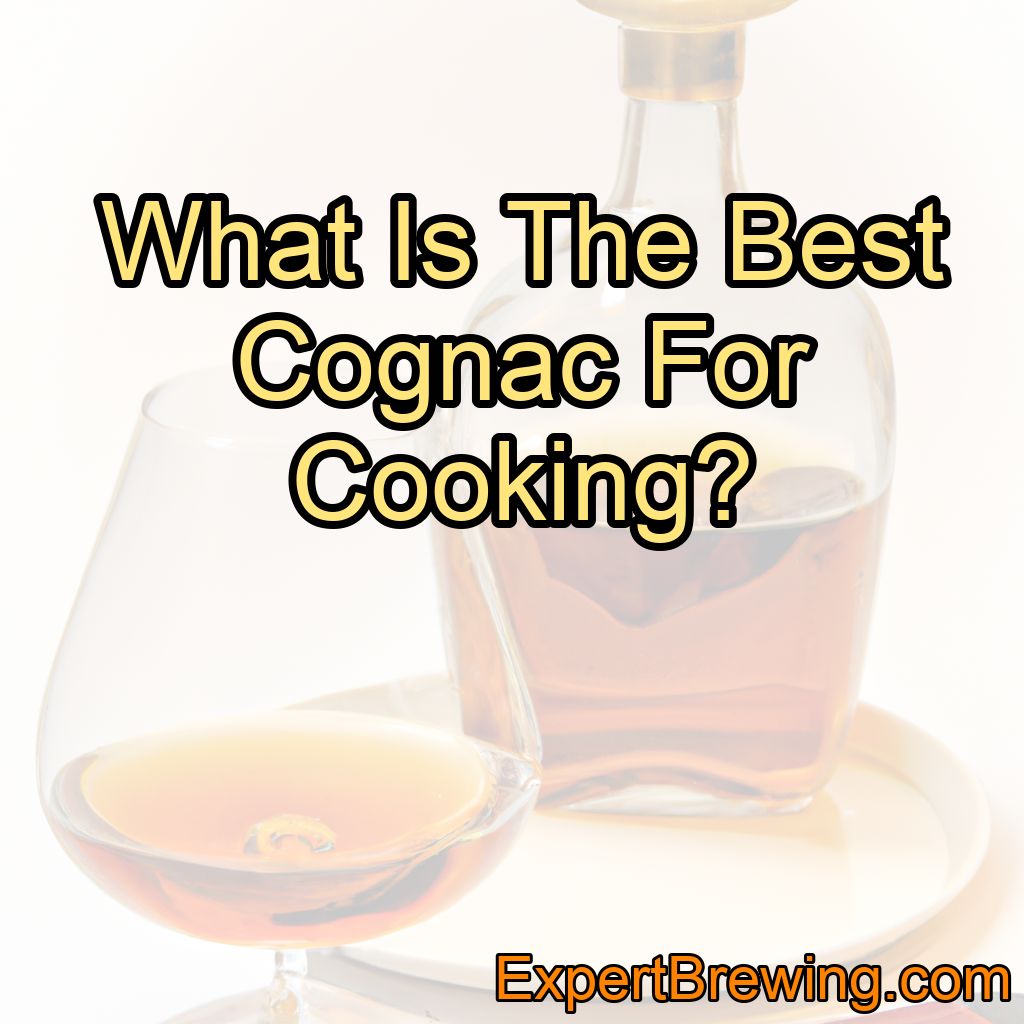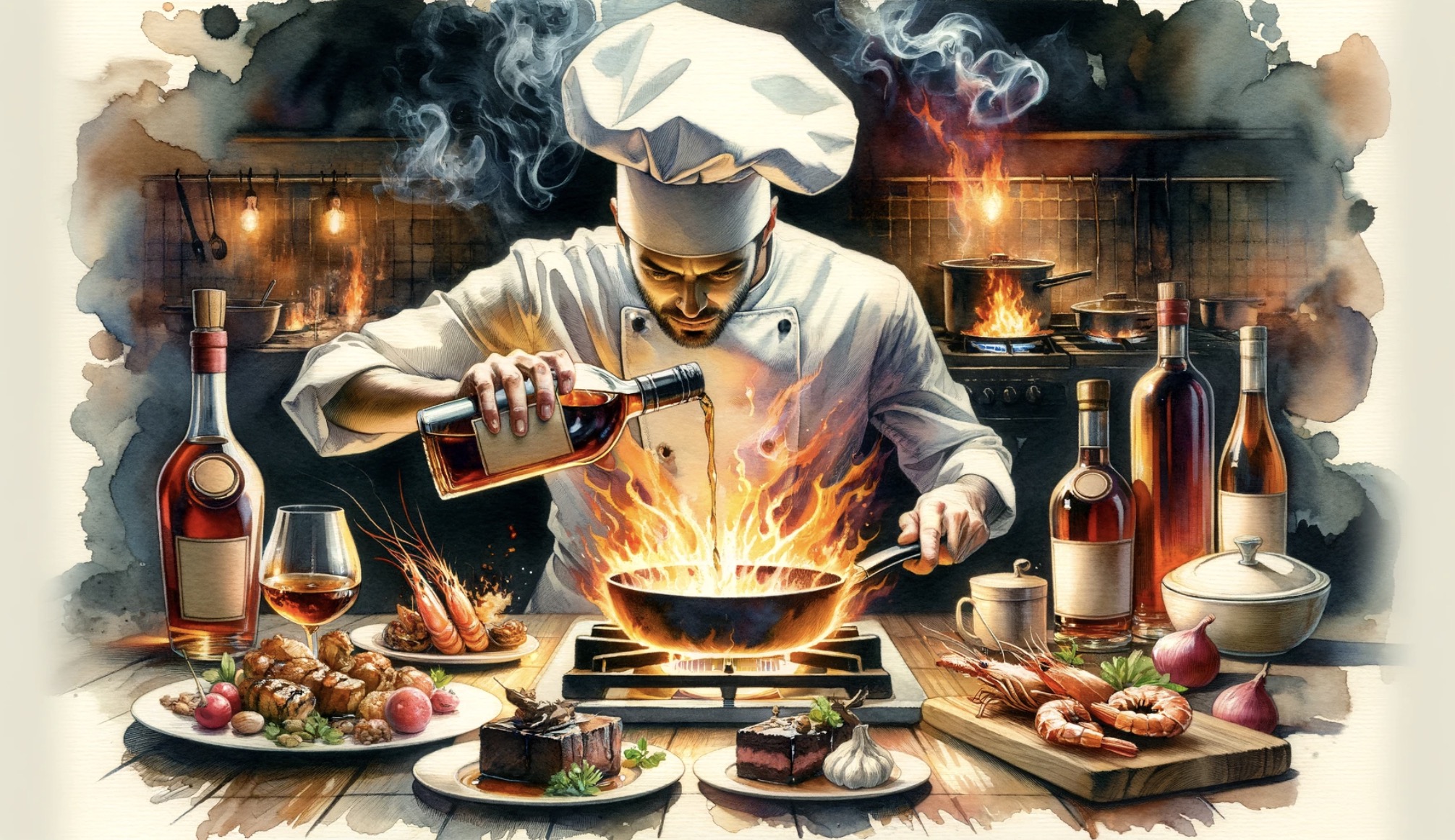When it comes to cooking, one of the most versatile and flavorful ingredients you can use is cognac. This rich and complex spirit not only adds depth and flavor to your dishes but also imparts a unique aroma that is hard to replicate.
But with so many cognacs on the market, which one is the best for cooking?
In my experience, the best cognac for cooking is one that has a balanced and rich flavor profile, without being too overpowering or expensive. In this blog post, we will explore the world of cognac, its different types and flavors, and ultimately help you find the best cognac for cooking.
What is Cognac?
Cognac is a type of brandy that is produced in the Cognac region of France. It is made from white grapes, primarily the Ugni Blanc variety, and is aged in oak barrels for a minimum of two years.
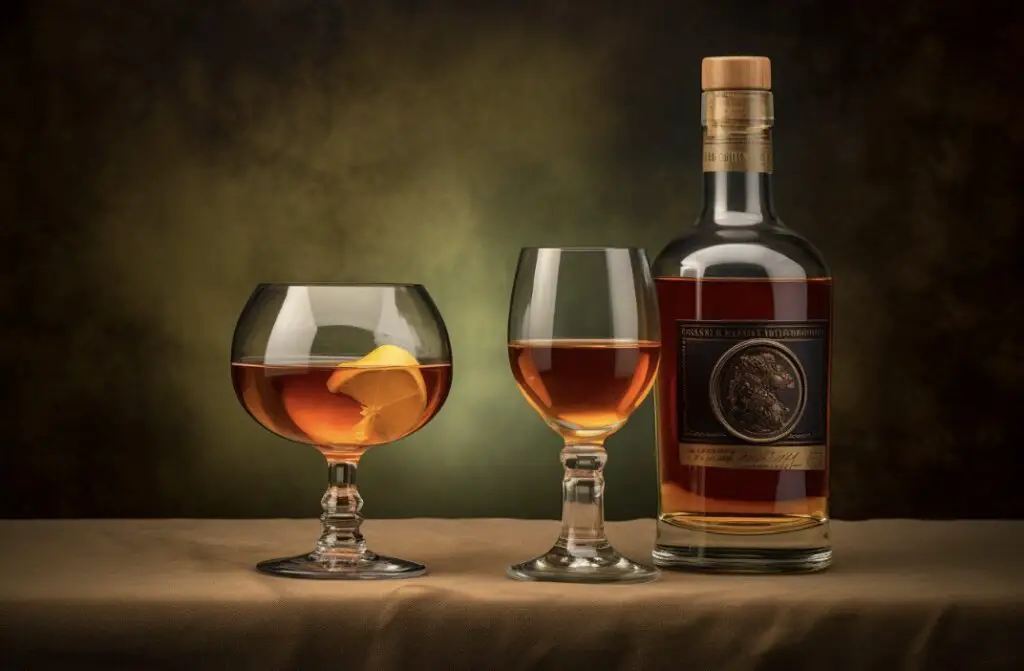
The aging process imparts the cognac with its distinct flavor, which can range from fruity and floral to spicy and smoky. Due to the strict production regulations, the quality of cognac is generally quite high, making it an excellent choice for cooking.
The Different Types of Cognac
There are four main categories of cognac, which are based on the length of time the spirit has been aged.
These are:
1. VS (Very Special): Aged for a minimum of two years. These cognacs are generally lighter in flavor and more affordable, making them a good choice for cooking.
2. VSOP (Very Superior Old Pale): Aged for a minimum of four years. These cognacs have a more developed flavor profile, with hints of dried fruit and spice. They can be used for cooking, but are also enjoyable to sip on their own.
3. XO (Extra Old): Aged for a minimum of six years, but often much longer. These cognacs have a complex and rich flavor profile, with notes of chocolate, leather, and tobacco. While they can be used in cooking, their high price point often makes them better suited for sipping.
4. Hors d’Age (Beyond Age): These cognacs are aged for an exceptionally long time, often several decades. They are extremely rare and expensive, and are typically reserved for special occasions, rather than cooking.
Factors to Consider When Choosing a Cooking Cognac
When selecting the best cognac for cooking, there are several factors to keep in mind. These include:
– Price: While it’s true that you get what you pay for, there’s no need to break the bank when it comes to cooking with cognac. A reasonably priced VS or VSOP cognac will generally provide enough flavor and complexity for most recipes.
– Flavor Profile: The specific flavors of the cognac will have a big impact on the final dish, so it’s important to choose one with a flavor profile that complements the other ingredients. For example, a fruity and floral cognac might work well in a dessert, while a spicy and smoky cognac could be perfect for a savory dish.
– Availability: Depending on where you live, certain brands or types of cognac may be more difficult to find. It’s always a good idea to choose a cognac that is readily available in your area, so you don’t have to go on a wild goose chase every time you want to cook with it.
Recommended Cognacs for Cooking
Based on my personal experience and the factors discussed above, here are some of my top recommendations for the best cognacs for cooking:
1. Hennessy VS: This popular and widely available cognac has a smooth and balanced flavor profile, with notes of fruit, vanilla, and oak. It’s affordable and versatile, making it an excellent option for cooking.
2. Courvoisier VS: Another well-known brand, Courvoisier’s VS cognac has a slightly sweeter flavor, with hints of peach and apricot. It works particularly well in recipes that call for a touch of sweetness.
3. Rémy Martin VSOP: For those looking to splurge a bit, this VSOP cognac offers a more complex flavor profile, with notes of dried fruit, spice, and a hint of chocolate. It’s a great choice for dishes that require a bit more depth and sophistication.
4. Martell VS: With its fruity and floral flavors, Martell’s VS cognac is a great option for recipes that call for a lighter touch. It’s particularly well-suited to desserts and fruit-based dishes.
Best Budget Cognacs for Cooking
So, what about the best cheap cognacs to use in your dishes? You might not want to spend a fortune on a stellar Hors d’Age cognac for an everyday dish or marinade for your steak, so here are some cheaper cognacs that I would personally recommend:
| Cognac | Price (Approx.) | Pros | Cons | Good for |
|---|---|---|---|---|
| Classic Club Brandy VSOP | $7.99/750 ml | Medium-bodied, soft, vanilla and fruity | Limited complexity | Cocktails, mild brandy flavor in dishes |
| St-Rémy VSOP | $15.60/750 ml | Berry, vanilla, oak notes, well-balanced | Lighter flavor may be too subtle | Neat drinking, complementing dishes |
| Raynal VSOP | $15.49/750 ml | Complex, hints of ginger, candied fruit | Specific flavor notes may not pair well | Adding depth to dishes |
| Paul Masson Brandy Grande Amber VS | $6.99/375 ml | Sweet, caramel and vanilla notes | Smaller size, less sophisticated | Cocktails, base in recipes |
| Odessa VSOP Brandy | $10.49/750ml | Rich, honey, raisin, fig, vanilla | Specific flavor might be too distinct | Enhancing dishes with rich flavor |
| Decourtet VS Cognac | $20-$27.49/750ml | Smooth, velvety, floral, versatile | Floral notes might not suit all savory dishes | Sweet dishes, desserts, spicier savory dishes |
| Hennessy XO Cognac | $211-$242/750ml | Rich dried fruit, prune, cocoa, oak, nuts | More expensive, strong flavor may dominate | Savory dishes, sauces |
| Courvoisier XO Cognac | $139-$169.99/750ml | Peach notes, woody, good for sweet and savory | May not be versatile for all cooking | Desserts, rich meat dishes, sauces |
| Martell Cognac | $40.99/750ml | Rich, plum, apricot, candied lemons | Might be too rich for lighter dishes | Pan-searing meats, creamy and earthy sauces |
I would recommend the younger variants here if you are on a budget, but the XO cognacs can really add depth to your dishes. And whereas the prices here may seem high for these, they are relatively cheap their age and quality taken into account.
Why use Cognac in Cooking?
Cognac is used in cooking for several reasons:
- Flavor Depth: Cognac adds a rich, deep flavor to dishes. Its complex notes of fruit, spice, and oak can enhance the overall taste profile of a recipe.
- Deglazing: It’s excellent for deglazing pans to make sauces. When used to deglaze, it helps lift the fond (browned bits from cooked meat) off the pan, incorporating these flavorful bits into the sauce.
- Flambé Technique: Cognac is often used in flambé dishes. When ignited, it imparts a subtle caramelized flavor to the food.
- Aroma: The aroma of cognac can add an extra sensory dimension to dishes, particularly in sauces and desserts.
- Preservation: In historical contexts, cognac was used as a means of preserving food, and it continues to be used in some traditional recipes for this reason.
- Rich Sauces and Marinades: Cognac is commonly added to marinades and sauces, particularly in French cuisine, to provide richness and complexity.
- Balancing Flavors: It can help balance out sweet and savory elements in a dish, creating a more harmonious flavor profile.
Remember, when cooking with cognac, the alcohol content diminishes while the essence of its flavor remains, making it a versatile ingredient in both savory and sweet dishes.
Tips for Cooking with Cognac
When using cognac in your cooking, it’s important to remember that a little goes a long way. Start with a small amount and adjust to taste, as the flavor can become overpowering if you’re not careful.
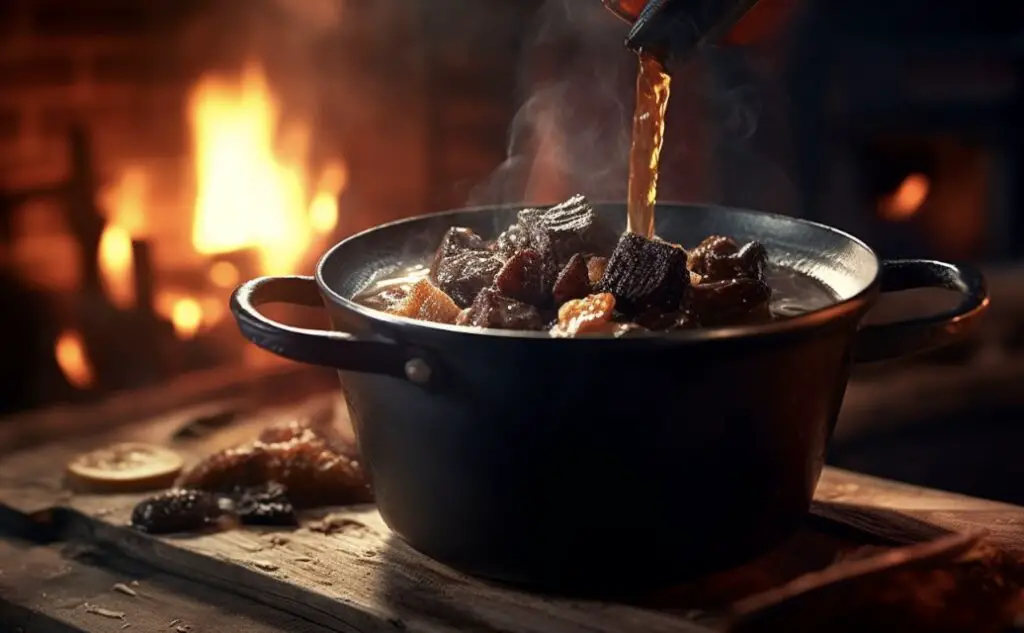
Additionally, be aware that adding cognac to a hot pan can cause it to ignite, so always remove the pan from the heat before adding the cognac, and return it to the heat once the cognac has been stirred in.
Cognac-Infused Recipes to Try
Now that you have a better understanding of the best cognacs for cooking and how to use them, it’s time to put your newfound knowledge to the test!
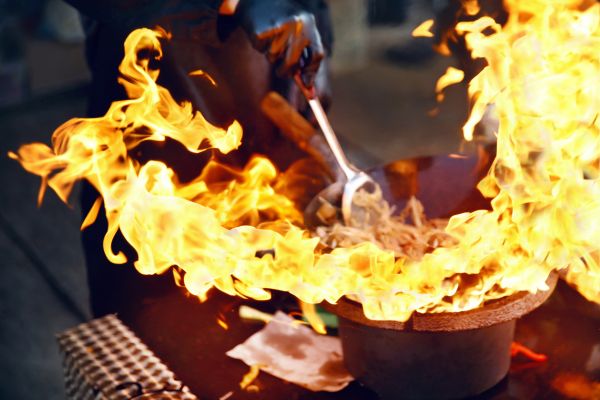
Here are a few of my favorite recipes that feature cognac as a key ingredient:
- Steak au Poivre: This is a quintessential French delicacy where the steak is coated with coarsely cracked peppercorns before searing, creating a robust crust. The dish is then elevated with a creamy cognac-infused sauce, which is made by deglazing the pan with cognac, adding heavy cream, and reducing it to a rich, velvety consistency. This sauce perfectly complements the spicy peppercorn crust on the steak.
- Cognac Shrimp: In this luxurious dish, shrimp are sautéed in butter until just pink and then flambeed with cognac, creating a rich, aromatic flavor. The sauce, enriched with cream and seasoned delicately, is poured over the shrimp. It’s a sumptuous meal, ideal over a bed of fluffy rice or twirled into your favorite pasta.
- Cognac and Mushroom Chicken: This heartwarming dish features chicken thighs that are browned to perfection and then simmered in a creamy sauce made with cognac, mushrooms, and a blend of herbs. The cognac adds a depth of flavor to the sauce, complementing the earthiness of the mushrooms and the tenderness of the chicken, making it a comforting meal for any occasion.
- Cognac Chocolate Truffles: These are rich, velvety chocolate truffles with a sophisticated twist, thanks to a splash of cognac. The cognac infuses the chocolate with a warm, deep flavor, elevating the truffles to a luxurious treat. They are perfect for gifting or as an elegant end to a dinner party.
Conclusion
In conclusion, the best cognac for cooking is one that has a balanced and rich flavor profile, without being too overpowering or expensive. Some of my top recommendations include Hennessy VS, Courvoisier VS, Rémy Martin VSOP, and Martell VS. By selecting the right cognac and following a few simple tips, you can elevate your cooking and create truly memorable dishes.
Here are the top 10 facts about cognac in cooking:
1. Cognac is a type of brandy produced in the Cognac region of France.
2. It is made from white grapes, primarily the Ugni Blanc variety.
3. Cognac is aged in oak barrels for a minimum of two years.
4. There are four main categories of cognac: VS, VSOP, XO, and Hors d’Age.
5. The best cognac for cooking is one that has a balanced and rich flavor profile.
6. Price, flavor profile, and availability are key factors to consider when choosing a cooking cognac.
7. Some recommended cognacs for cooking include Hennessy VS, Courvoisier VS, Rémy Martin VSOP, and Martell VS.
8. Start with a small amount of cognac in your recipes and adjust to taste.
9. Always remove the pan from the heat before adding cognac to avoid flare-ups.
10. Cognac can be used in a wide range of dishes, from savory entrées to decadent desserts.
FAQs
What alcohol can I substitute for brandy in cooking?
When substituting brandy in cooking, you can consider using other types of alcohol such as cognac, whiskey, rum, or even red wine. The choice of substitute depends on the specific recipe and the flavors you want to achieve.
What alcohol tastes like brandy?
Brandy has a unique flavor profile that is difficult to replicate exactly. However, if you are looking for spirits that have similar flavor characteristics, you may consider Cognac, Armagnac, or certain types of aged rum. These spirits often exhibit rich, fruity, and aromatic notes that are reminiscent of brandy.
Is brandy the same as cognac for cooking?
No, brandy and cognac are not exactly the same for cooking. While both are types of distilled spirits made from grapes, cognac is a specific type of brandy that must be produced in the Cognac region of France using specific grape varieties and production methods. Cognac is known for its distinct flavor profile and is often considered higher quality than other brandies. However, for cooking purposes, you can generally use either brandy or cognac interchangeably, depending on your preference and the recipe.
What can you use in place of brandy in a recipe?
In place of brandy in a recipe, you can use a variety of alternatives depending on the flavor profile you desire. Some common substitutes include cognac, rum, bourbon, whiskey, or a combination of fruit juices like apple or grape. These alternatives can provide similar depth and complexity to your dish.
What liquor tastes like Cognac?
Brandy is a liquor that closely resembles the taste of Cognac. It is made from distilled wine and shares similar characteristics such as rich flavors, fruity notes, and a smooth finish.
Are cognac and brandy interchangeable for cooking?
Cognac and brandy are similar in terms of being distilled spirits made from grapes, but they have distinct characteristics. While they can be used interchangeably in some recipes, it’s important to consider their flavor profiles.
Cognac tends to have a more refined and complex taste, with fruity and floral notes, whereas brandy can vary in flavor depending on the specific type.
If a recipe specifically calls for cognac, using brandy may alter the intended taste. However, in most cooking applications, the difference may not be significant enough to affect the final dish.

